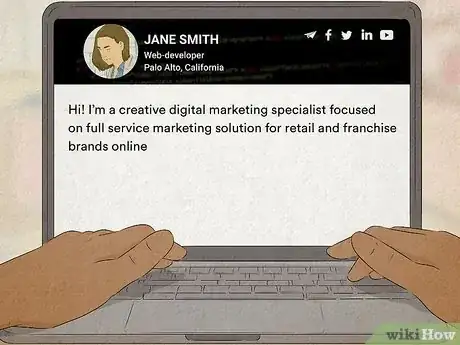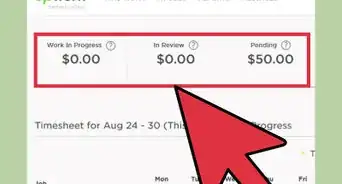This article was co-authored by Stan Kats. Stan Kats is a Professional Technologist and the COO and Chief Technologist for The STG IT Consulting Group in West Hollywood, California. Stan provides comprehensive technology solutions to businesses through managed IT services, and for individuals through his consumer service business, Stan's Tech Garage. Stan holds a BA in International Relations from The University of Southern California. He began his career working in the Fortune 500 IT world. Stan founded his companies to offer an enterprise-level of expertise for small businesses and individuals.
There are 9 references cited in this article, which can be found at the bottom of the page.
This article has been viewed 147,209 times.
If you are a self-starter who likes problem solving and logical thinking, being a software consultant could be the right career choice. The finance, government, automotive, and aerospace sectors rely on software consultants to give them technical advice. Consultants advise clients on how to configure large applications, write code, or fix bugs. They customize software systems for specific tasks or industries. Software consultants also analyze company computer systems to determine how software can make processes more efficient.[1] To be a software consultant, you should acquire the necessary education or training, market yourself effectively, and solicit clientele.
Steps
Education and Experience
-
1Learn about software engineering, software development, web design, and troubleshooting. Mastering the fundamentals of software engineering will help you see if this career is the right fit. One option is to obtain a Bachelor of Software Engineering (B.SE.) at an ABET accredited college or university. You also could teach yourself from books, online tutorials, and/or trial and error. Some students obtain masters degrees in software engineering as well.
- Many software engineering degree programs require that applicants have taken advanced computer science and math courses in high school.[2] If you have finished high school and did not take these courses, enroll in a community college to gather necessary credits.
- Read software engineering blogs to stay informed with developments in the field.[3]
-
2Seek an internship or part-time job in software engineering. During your studies or self-education time, gain practical experience through employment.[4] Use university resources to perfect your resume. Attend career fairs to discuss software engineering jobs with technology sector employees.Advertisement
-
3Acquire your first software engineering job. Apply for entry-level jobs in software engineering to prepare to become a consultant. During this time, you should work towards earning your engineering license. To receive your license, you must pass the Fundamentals of Engineering exam. You can take the exam after four to six years of employment.[7]
- Upon receiving your engineering license, you should understand the foundations of software engineering, development, and troubleshooting. You should have programming skills in programming languages like C++, Java, HTML, SQL, Perl, Falcon, Lynx, and Matlab.
Develop Your Specialty
-
1Find your niche. Within software consulting, find your area of specialization so you can offer something specific to customers. If you find a particular area of software engineering that interests you, you are more likely to enjoy work.[8] Pick a specialization in, for example, cyber security, networking, or systems engineering. Research which software consulting services are available near you and what is lacking.
-
2Network with other software engineers. Attend conferences and networking events with other software engineers to build connections. Pay particular attention to experts working in your specialty. Attend experts' conference lectures and try to meet them afterwards. Ask the experts and your colleagues for blog recommendations and/or advice.[9]
-
3Develop your own software in your specialty. You might create an application for a smartphone or something more advanced like internet security software. Do multiple trials and work out any kinks. By developing and perfecting your own product, you will have a finished project to show to prospective clients.
Launch Your Business
-
1Set up your business. When your software is complete and you are ready to begin consulting, develop your company name and logo. Use these items in your marketing materials. Set your hourly rate and create a billing system. Do market research to see what others charge in your geographic and expertise areas. In determining your rate, also consider your expenses.[10]
- As you gain expertise, you can adjust your billing rates. Be sure to raise rates at convenient times for clients, such as the end of the fiscal or calendar years. Be transparent about any rate changes.
-
2Market your software and consulting services. Create brochures, a website, and business cards. Advertise how your skills, experience, and education can help a company. Demonstrate why your software is better or how it compares to other software. It will take time to build your client list. Consider keeping your full-time job at first to ensure a steady income. Once you have clients, your expertise, communication style, and business communications will develop further.
- Explain that you have software for sale and offer services as a consultant in your area of expertise. If you can do troubleshooting or write code, specify that as well. Include this information on your business cards.
- Think about offering company-wide or online seminars and how-to tutorials. You want to seem approachable and knowledgeable. Attendees also might ask you to work for them or give your name to others.
-
3Broadcast your success. With client permission, advertise completed projects. Use conference papers, a blog, and/or a website to publicize your work. Utilize social media websites, like Facebook or Twitter, to advertise and to write posts about your successes.
- Ask satisfied clients to recommend you to colleagues or friends. By using the snowball effect, your business should grow quickly.
Succeed as a Consultant
-
1Practice good time management. If you remain self-employed and independent, your schedule will be more flexible. Track hours and plan days ahead to ensure that you complete work in a timely, efficient manner. Schedule hours for phone calls, client meetings, and networking events.
-
2Manage your finances. Consider hiring a Certified Public Accountant (CPA). As an independent contractor, your tax situation will be more complicated than if you were an employee. If you live in the U.S., you must pay full social security contributions and purchase health insurance. Plan to contribute money to a private pension plan. Consider purchasing professional liability insurance to protect you in the case of a client lawsuit.[11]
- If you have a spouse with health insurance, you might avoid needing to purchase insurance.
-
3Continue networking. Within the software consulting industry, who you know is vastly important. Some consultants spend ten hours a week connecting with new contacts and maintaining past relationships. Be willing to help consultants who have less experience than you.
Expert Q&A
-
QuestionWhat skills do you need to be an IT consultant?
 Stan KatsStan Kats is a Professional Technologist and the COO and Chief Technologist for The STG IT Consulting Group in West Hollywood, California. Stan provides comprehensive technology solutions to businesses through managed IT services, and for individuals through his consumer service business, Stan's Tech Garage. Stan holds a BA in International Relations from The University of Southern California. He began his career working in the Fortune 500 IT world. Stan founded his companies to offer an enterprise-level of expertise for small businesses and individuals.
Stan KatsStan Kats is a Professional Technologist and the COO and Chief Technologist for The STG IT Consulting Group in West Hollywood, California. Stan provides comprehensive technology solutions to businesses through managed IT services, and for individuals through his consumer service business, Stan's Tech Garage. Stan holds a BA in International Relations from The University of Southern California. He began his career working in the Fortune 500 IT world. Stan founded his companies to offer an enterprise-level of expertise for small businesses and individuals.
Professional Technologist What makes a good IT professional is having an insatiable desire to learn more about how technology works. You should definitely be solution-oriented and have a real desire to help people work through their technology issues.
What makes a good IT professional is having an insatiable desire to learn more about how technology works. You should definitely be solution-oriented and have a real desire to help people work through their technology issues. -
QuestionHow can I learn different software?
 Stan KatsStan Kats is a Professional Technologist and the COO and Chief Technologist for The STG IT Consulting Group in West Hollywood, California. Stan provides comprehensive technology solutions to businesses through managed IT services, and for individuals through his consumer service business, Stan's Tech Garage. Stan holds a BA in International Relations from The University of Southern California. He began his career working in the Fortune 500 IT world. Stan founded his companies to offer an enterprise-level of expertise for small businesses and individuals.
Stan KatsStan Kats is a Professional Technologist and the COO and Chief Technologist for The STG IT Consulting Group in West Hollywood, California. Stan provides comprehensive technology solutions to businesses through managed IT services, and for individuals through his consumer service business, Stan's Tech Garage. Stan holds a BA in International Relations from The University of Southern California. He began his career working in the Fortune 500 IT world. Stan founded his companies to offer an enterprise-level of expertise for small businesses and individuals.
Professional Technologist Build a home lab! Many big vendors have very inexpensive or even free evaluation tools to help people get familiar with their products. This is especially helpful if you're just getting started in the field.
Build a home lab! Many big vendors have very inexpensive or even free evaluation tools to help people get familiar with their products. This is especially helpful if you're just getting started in the field.
References
- ↑ http://www.payscale.com/research/US/Job=Software_Consultant/Salary
- ↑ http://study.com/computer_software_engineering_bachelor.html
- ↑ https://github.com/kilimchoi/engineering-blogs
- ↑ Stan Kats. Cybersecurity Expert. Expert Interview. 27 October 2021.
- ↑ Stan Kats. Cybersecurity Expert. Expert Interview. 27 October 2021.
- ↑ Stan Kats. Cybersecurity Expert. Expert Interview. 27 October 2021.
- ↑ http://theinstitute.ieee.org/ieee-roundup/opinions/ieee-roundup/answers-to-faqs-about-software-licensing
- ↑ http://www.udidahan.com/2007/07/19/6-simple-steps-to-becoming-a-top-it-consultant/
- ↑ http://www.udidahan.com/2007/07/19/6-simple-steps-to-becoming-a-top-it-consultant/









































































